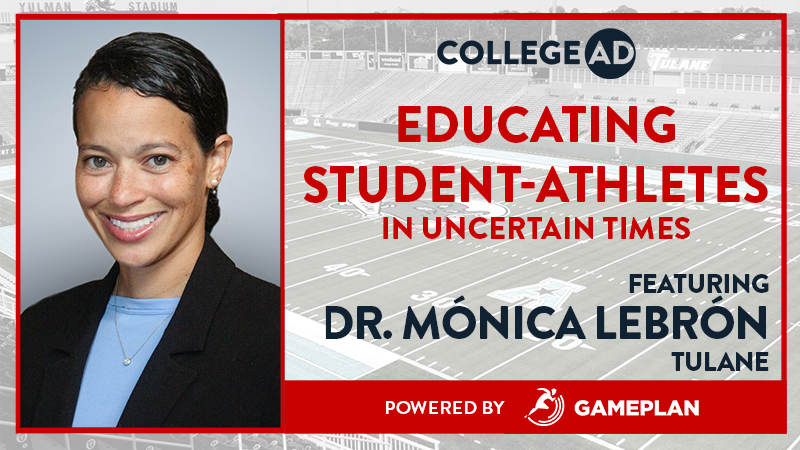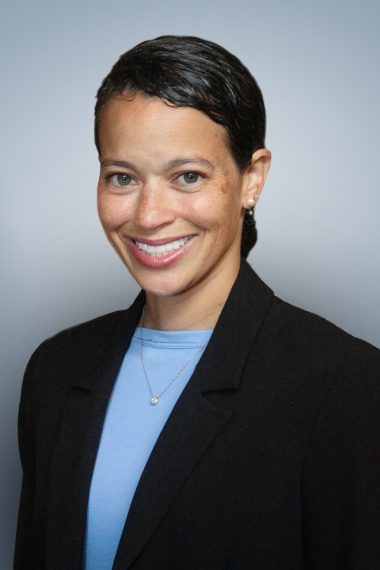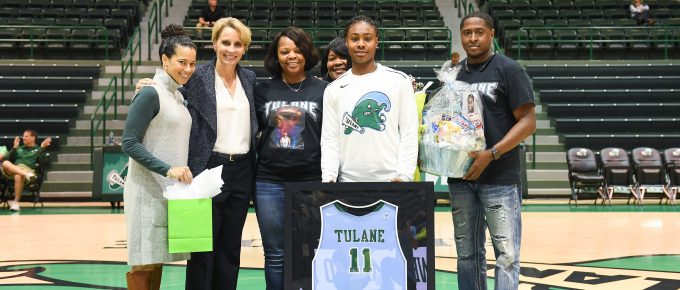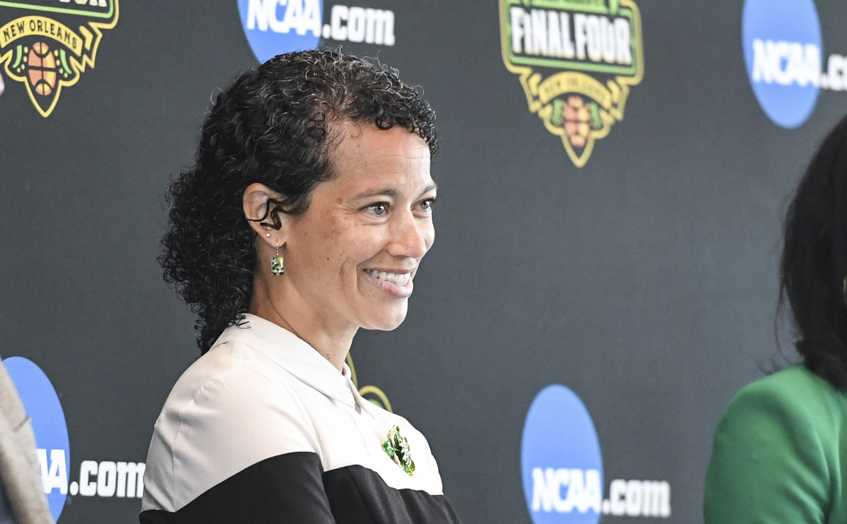
“It’s easy to look them in the eye and say, I know what you’re going through and actually mean it. Even though I’m about to have my 20th reunion from Yale, even though it’s been 20 years, it feels like it was yesterday. And the reality is it’s not that much different. Especially at a place like Tulane.” -Dr. Mónica Lebrón
 Dr. Mónica Lebrón was named Deputy Athletics Director and Chief Operating Officer for Tulane University Athletics in August of 2016. While those days as a student-athlete at Yale are behind her, she uses the experience she gained in that space to help her in her job every day.
Dr. Mónica Lebrón was named Deputy Athletics Director and Chief Operating Officer for Tulane University Athletics in August of 2016. While those days as a student-athlete at Yale are behind her, she uses the experience she gained in that space to help her in her job every day.
“I can look them in the eye and say, ‘Guys, I know what it means to want to compete for a national championship at an academically rigorous institution and still want to have a life and have the college experience and have fun and try to balance all of that without putting too much pressure on yourself.’ I’m here for them, which means my door’s always open.”
Lebrón says creating a culture that starts with the student-athlete experience is important. She believes that helps every staff member keep an eye on that ultimate goal.
“I am one person, there’s only 24 hours in a day for me, but I also have a responsibility and an obligation to set the example for the rest of our executive team. I’m the number two in the department, certainly have the ability to set that example so that the rest of the executive team wants to adopt. Thankfully I can rely on my teammates.”
Dr. Mónica Lebrón explains that the student-athlete experience touches all aspects of her job at Tulane. When her team is recruiting prospective student-athletes, their families want to hear about more than what they can accomplish on the field.
“Especially the parents want to hear that my kid has more than just four years of playing basketball or four years of running the ball up the field. They want to know, ‘how are you nurturing my child while they’re on your campus and away from our care?’ They also want to know how we are preparing them and equipping them to live the next four years and operate in our society.”
Lebrón explains, preparing student-athletes for life after their chosen sport is a goal they must all work on together.
“Once they get here, that’s where we, as administrators, come in to remind them do not wait until your senior year to come talk to me. I talk to every team at the beginning of the year, but then I try to get into their ear throughout the year. It’s somewhat uncomfortable for an 18, 19, 20-year-old to come to what they call the third floor, which is where I’m located. And sit in my office almost like it’s the principal’s office, but when I have a relationship with them and they start to feel comfortable, that’s when they’ll utilize me.”
 She gave the example of women’s basketball player, Caylah Cruickshank, who is now a graduate assistant at Oklahoma.
She gave the example of women’s basketball player, Caylah Cruickshank, who is now a graduate assistant at Oklahoma.
“It was one of these organic moments on a road trip where I sat next to her at lunch and started asking her, ‘what are you going to do for the summer? What are you studying? What do you hope to do after you graduate?’ The next thing you know, she’s asking me what I do. Fast-forward, I get an email from Oklahoma about their ethnic minority graduate assistant program that they have, which is phenomenal. I immediately forwarded that to Caylah. She applies, she gets an interview. I practiced the interview with her. She gets a second-round interview. I practiced that with her. And next thing you know, that following year, she started as a graduate assistant at Oklahoma when six months ago she had never even heard of it.”
The student-athlete experience at Tulane also factors into fundraising, she explained how the university is now offering study abroad options to student-athletes starting in their junior year. This was something that in the past, had only been available to non-athletes at Tulane.
“We announced that [study abroad program] at our intercollegiate athletics committee meeting, and next thing you know, a donor raises their hand and said, ‘hey, here’s $50,000 towards that program. And I’ll commit it for the next five years.’ When you can speak right to the donor’s heart and something that they can relate to, life after sport, your hope is that they will support the programs.”
Lebrón admits that the global pandemic has been a challenge, but her staff has embraced the extra steps necessary to make sure the student-athlete experience at Tulane stays second to none.
“Obviously when we were all home, we had to go to zoom. Every single academic interaction with the academic advisors or the tutors, all of that was done via zoom. I think it is so powerful, especially because our kids come from all over. Come Holidays, they’re going to be spread all over the country. The fact that now we know what zoom is and how to use it, I think will help us even more in terms of conducting business.”
 Dr. Mónica Lebrón says some of the changes they’ve implemented since the start of the pandemic will likely be utilized long after it’s over. Especially in the area of cost-saving measures.
Dr. Mónica Lebrón says some of the changes they’ve implemented since the start of the pandemic will likely be utilized long after it’s over. Especially in the area of cost-saving measures.
“We’ll continue to be just fiscally responsible. We forced ourselves to ask the question, ‘do we really need to do this?’ Do we really need to travel this many people on a charter trip? I say this all the time, even pre COVID, I would say to anyone I oversee, treat it as if it’s your own pocketbook as if it’s your own money as if it’s your own checking account.”
She also highlighted a specific program they have developed that will help student-athletes navigate the upcoming name, image, and likeness legislation.
“We created something called Wave Brand Works to focus on name, image, and likeness, and really it’s another program to educate our kids over the course of the next year on branding, entrepreneurship, agents, marketers, and we even have a health component for them. We wanted to prepare them so that when, name, image, and likeness is officially here, they can use it to their advantage. They’ll have some education behind that. I’m really proud of that program.”
She explains the program is set up with educational panels. One included social media influencers and more are scheduled for later in 2021. They discuss things like best practices, how to promote brand, and eventually, implantation and compliance.
“Our NIL working group meets once a month and it has our compliance person. Actually, our legal expert right here on campus is the nation’s leading expert in name, image, and likeness, Gabe Feldman. He runs our sports law program. We meet once a month to try and tackle some of those questions and try to figure out okay when it is here, how are we going to facilitate it? And that just has not been ironed out yet.”
However, Mónica Lebrón isn’t just thinking about the student-athlete experience, she’s also working towards making sure the people in her department are having career fulfilling opportunities as well.
“Our assistant coaches, I can’t speak for every school, but for our school, they’ve just been part of the family. They have not been forgotten and for a school like ours, where we don’t have the resources to have full full-time staff and 300 deep like we did at Florida or Georgia. Our GA’s are vital. I mean, we wouldn’t be able to survive without GA’s. We see them as full-time staff and hopefully, they feel like they’re developing in this industry. Through our Green Wave Justice for All action and accountability plan, we want to add a GA specifically for students of color. We’d love for it to be one of our student-athletes who wants to get into college athletics and wants to learn the ropes. Hopefully, we’ll implement that come September of 2021.”
This type of program is one that is close to Mónica Lebrón and her own experience as a student-athlete who made the jump to administration.
“I was an ethnic minority and women’s intern at the NCAA. It’s no longer called that anymore. It’s the post-graduate internship program. The whole purpose of it was to recruit people of color and/or females to learn college athletics administration so that we can put more people of color and put more women in the membership and then into working in college athletics. I am a product of that and I’m proud to have gone through the program and I’m proud to still work in college athletics.”
